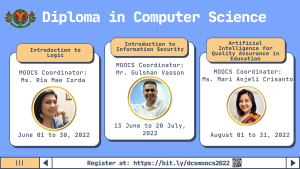
This 2022, three Massive Open Online Courses (MOOCs) were launched with the intention of making the transition to the Diploma in Computer Science (DCS) program easier and supplying additional computer science-related skills and knowledge to the interested public: Introduction to Logic, Introduction to Information Security, and Artificial Intelligence for Quality Assurance in Education. These courses are free, online, and enrollment is open to anyone interested. More than 1,100 students took interest in short courses and enrolled in them.
For the whole month of June, Ms. Ria Mae Corda taught “Introduction to Logic” to the 445 participants enrolled in the course. The course had been divided into four parts: propositional logic, predicate logic and rules of inference, set theory, and graph theory. A total of 150 students completed the course successfully and were given certificates.
From 13 June to 20 July, Mr. Gulshan Vasson, headed the course “Introduction to Information Security” which had 453 enrollees. The course consisted of ten modules: overview, security threats, and vulnerabilities, risk assessment and management, access control, data protection, protecting critical assets, security controls, incident response, business continuity and disaster recovery, and security awareness. Only 134 students completed the course and received certificates.
In August, the month-long course titled “Artificial Intelligence for Quality Assurance in Education” is headed by Asst. Prof. Mari Anjeli Crisanto with 209 registered participants. Asst. Prof. Crisanto is the Program Chair of the DCS and is also the Assistant to the Vice Chancellor for Academic Affairs for Quality Assurance. The course is divided into five modules and uses gamified features in the course to engage its students with the help of Asst. Prof. Cecille Moldez. Of the 209 participants, 57 have completed the course and were given a certification.
All the MOOCs were offered through UPOU’s MOOCS platform, MODeL. Other UPOU MOOCs on various topics are available to the public for free via model.upou.edu.ph.
Contributed by the UPOU Faculty of Information and Communication Studies








![[Job Vacancy]
The UP Open University is looking for one (1) University Extension Associate I under the Faculty of Information and Communication Studies (FICS).
For more information, visit upou.edu.ph/job-opportunities/ and submit your application via url.upou.edu.ph/hrapplication on or before 23 February 2026.
#UPOU
#UPOpenUniversity
#JobVacancy](https://www.upou.edu.ph/wp-content/plugins/instagram-feed/img/placeholder.png)